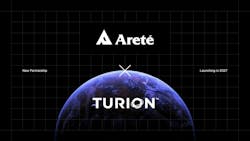Areté and Turion Space partner to test next-generation event camera in orbit
Questions and Answers
Q: What is the purpose of the Areté event camera mission? A: The mission will test Areté's event camera on a Turion DROID.alpha spacecraft to support development of a next-generation star tracker and enhance space domain awareness capabilities in low Earth orbit.
Q: How does the sensor technology work? A: The event camera detects changes in light at the pixel level in real time, capturing up to 10,000 frames per second while reducing power consumption and data bandwidth, enabling hyper-temporal imaging of fast-moving objects in space.
Q: What spacecraft and platform are being used? A: The camera will fly as a hosted payload on a Turion DROID.alpha spacecraft, integrated with Turion's Starfire software platform for mission control, automated tasking, and AI-powered data analysis.
NORTHRIDGE, Calif. - Areté in Northridge, Calif., and Turion Space in Irvine, Calif., have announced a partnership to fly Areté's next-generation event camera on a Turion DROID.alpha spacecraft as a hosted payload, scheduled for launch in 2027. The mission supports the Air Force Research Laboratory's effort to develop a next-generation star tracker and provides a critical capability for a future Space Domain Awareness Optical Fence in low Earth orbit.
The event camera is a novel sensor that detects changes in light at the pixel level in real time, allowing imaging at up to 10,000 frames per second. Unlike conventional cameras that capture full frames at fixed intervals, the sensor only records changes in each pixel, dramatically reducing data bandwidth and power requirements. This enables hyper-temporal imaging for observing fast-moving objects in space and supports autonomous, edge-processed data analysis on orbit.
Integration
Integrated with Turion's Starfire platform for mission control, automated tasking, and artificial intelligence (AI)-powered data products, the Areté payload will deliver near-real-time observations to end users with minimal latency. The system is designed to enhance both tactical responsiveness and strategic space domain awareness coverage across low Earth orbit.
"This capability redefines how we sense, process, and act in space," said Ryan Westerdahl, CEO of Turion Space. "By pairing Areté's event camera with our autonomous spacecraft and command layer, we are advancing the operational readiness and deterrence posture of U.S. space assets."
Areté develops sensors, real-time processing systems, software, and algorithms for applications from seafloor to space. Turion Space designs, builds, and operates space infrastructure, including satellites and integrated software platforms, focused on space domain awareness and in-space resiliency.
